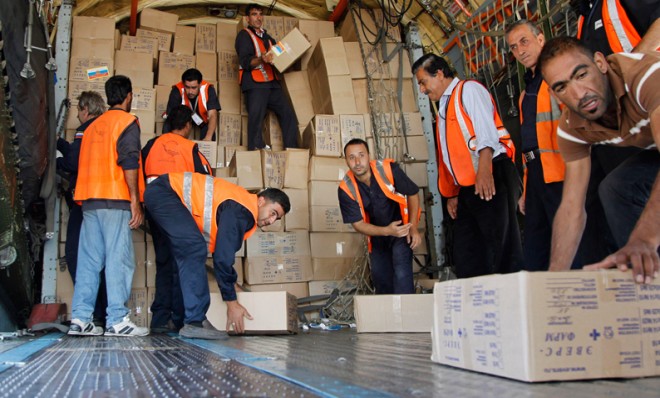4 signs Russia is abandoning Syria
Putin is supposed to be one of Assad’s biggest allies — so why is he doing so little to defend him?

A free daily email with the biggest news stories of the day – and the best features from TheWeek.com
You are now subscribed
Your newsletter sign-up was successful
Given Russia's outspoken opposition to U.S. intervention in Syria, you'd think that Russian President Vladimir Putin would be preparing to back that punchy rhetoric up with some military force.
After all, officials in Moscow have warned of "catastrophic consequences" if Washington dares to bypass the U.N., and Russian tabloid Komsomolskaya Pravda said that Russia would not "limit itself to warnings and expressions of anger" in the event of an attack.
But actually, as Gregory L. White argues today at the Wall Street Journal, it looks like Russia may have played all of its cards when it comes to Syria. More significantly, Putin doesn't seem to care, and apparently has very little appetite for standing by his country's supposed ally, Bashar al-Assad.
The Week
Escape your echo chamber. Get the facts behind the news, plus analysis from multiple perspectives.

Sign up for The Week's Free Newsletters
From our morning news briefing to a weekly Good News Newsletter, get the best of The Week delivered directly to your inbox.
From our morning news briefing to a weekly Good News Newsletter, get the best of The Week delivered directly to your inbox.
Here are four signs that the Russian president is abandoning Assad to his fate:
1. A warship feint
It's true that Russia this week deployed two warships to the Mediterranean Sea in response to rising expectations that the U.S. is preparing to carry out some sort of strike. But while that move may look pretty aggressive, Fred Weir notes at the Christian Science Monitor that "military officials practically fell over themselves in their haste to clarify that the deployment has nothing to do with the worsening situation in Syria."
White agrees, arguing that the deployment was "symbolic," and that the ships' primary purpose would be to provide security if Russia needs to evacuate the base it maintains in the Syrian port of Tartous. Of course, if Russia does end up evacuating from Syria, then Assad will look more isolated than ever.
A free daily email with the biggest news stories of the day – and the best features from TheWeek.com
2. Delayed weapons
Assad made a down payment on a supply of S-300s — a Russian-made long-range missile system — a few years ago, but has yet to see any sign of them. Putin acknowledged in June that he had delayed supplying the "serious weapon" because he didn't "want to throw the region off balance." But even though the likelihood of a Western strike has grown dramatically, Putin has still refused to deliver the goods, leaving Assad more vulnerable to an air-strike.
3. A Saudi buy-out?
Then there are the strange reports flying about that the Kremlin has agreed to drop its support for Assad in exchange for a $15 billion arms deal with Saudi Arabia, which has been a steadfast, if quiet, supporter of the Syrian opposition. According to Interpreter Magazine, which provides English translations of Russian media, Saudi Prince Bandar bin Sultan made Putin an offer he couldn't refuse during a meeting in Moscow at the end of July. Sounds unlikely, but stranger things have happened.
4. The government's own statements
Despite all the big talk, Russian officials have made it pretty clear that they want to avoid a military confrontation at all costs, with Russian Foreign Minister Sergei Lavrov explicitly stating that Moscow has "no plans to go to war with anyone." The most Assad can hope for is a step-up in the shipment of small weapons, which have been flowing to Syria for months.
But this shouldn't come as much of a surprise. Though Putin may have cast himself as Assad's defender, he's not particularly attached to the regime, and isn't likely to do anything that could threaten his popularity domestically. Indeed, a recent poll shows that only 40 percent of Russians oppose military intervention against the Assad regime — one percent less than in America, according to some polls.
That's not to say the Russian president has lost this fight. According to Georgy Mirsky, a prominent Russian Middle East expert quoted in Julia Ioffe's piece on the subject in The New Republic, Putin is sitting pretty. If the U.S. intervenes in Syria, the Russian president will be able to watch from the sidelines as the West gets sucked into another conflict, and enjoy his propaganda coup. "It'll show people here, again, America is showing its aggressive face," says Mirsky. "And Putin shows again he is a strong leader that raised Russia up off its knees, and that he has never and will never dance to an American tune."
Frances Weaver is a senior editor at The Week magazine. Originally from the U.K., she has written for the Daily Telegraph, The Spectator and Standpoint magazine.
-
 Switzerland could vote to cap its population
Switzerland could vote to cap its populationUnder the Radar Swiss People’s Party proposes referendum on radical anti-immigration measure to limit residents to 10 million
-
 Political cartoons for February 15
Political cartoons for February 15Cartoons Sunday's political cartoons include political ventriloquism, Europe in the middle, and more
-
 The broken water companies failing England and Wales
The broken water companies failing England and WalesExplainer With rising bills, deteriorating river health and a lack of investment, regulators face an uphill battle to stabilise the industry